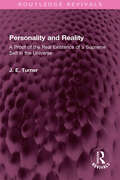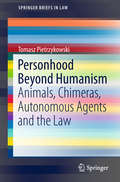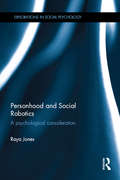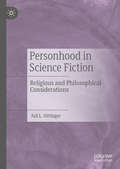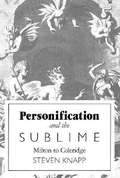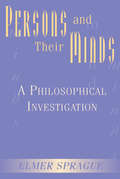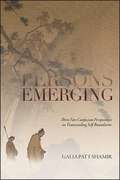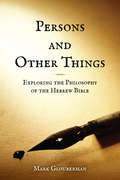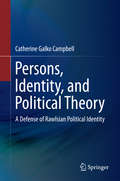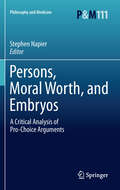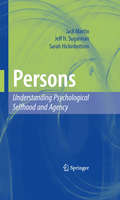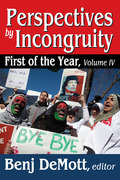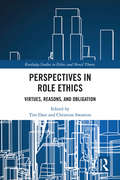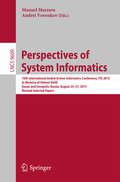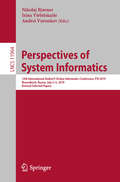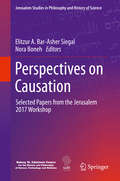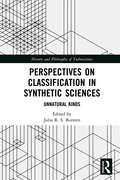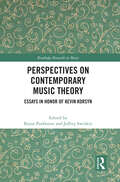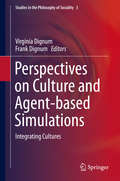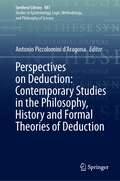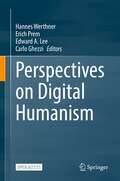- Table View
- List View
Personality and Reality: A Proof of the Real Existence of a Supreme Self in the Universe (Routledge Revivals)
by J. E. TurnerFirst published in 1926, Personality and Reality is the analysis of the place and function of mind and God. The author argues that the conception of a supreme Self is required for the interpretation of the Universe, just like the requirement of the system of space and time; and that both conceptions are established by necessities. This book will be of interest to students of philosophy, religion, literature and science.
Personhood Beyond Humanism: Animals, Chimeras, Autonomous Agents And The Law (SpringerBriefs in Law)
by Tomasz PietrzykowskiThis book explores the legal conception of personhood in the context of contemporary challenges, such as the status of non-human animals, human-animal biological mixtures, cyborgisation of the human body, or developing technologies based on artificial autonomic agents. It reveals the humanistic assumptions underlying the legal approach to personhood and examines the extent to which they are undermined by current and imminent scientific and technological advances. Further, the book outlines an original conception of non-personal subjecthood so as to provide adequate normative solutions for the problematic status of sentient animals and other kinds of entities. Arguably, non-personal subjects of law should be regarded as holding one right, and only one right - the right to be taken into account.
Personhood and Social Robotics: A psychological consideration (Explorations in Social Psychology)
by Raya A JonesAn exponentially growing industry, human robot interaction (HRI) research has drawn predominantly upon psychologists’ descriptions of mechanisms of face-to-face dyadic interactions. This book considers how social robotics is beginning unwittingly to confront an impasse that has been a perennial dilemma for psychology, associated with the historical ‘science vs. art’ debate. Raya Jones examines these paradigmatic tensions, and, in tandem, considers ways in which the technology-centred discourse both reflects and impacts upon understanding our relational nature. Chapters in the book explore not only how the technology-centred discourse constructs machines as us, but also how humans feature in this discourse. Focusing on how the social interaction is conceptualised when the human-robot interaction is discussed, this book addresses issues such as the long-term impact on persons and society, authenticity of relationships, and challenges to notions of personhood. By leaving aside terminological issues, Jones attempts to transcend ritual of pitching theories against each other in order to comprehensively analyse terms such as subjectivity, self and personhood and their fluid interplay in the world that we inhabit. Personhood and Social Robotics will be a key text for postgraduate students, researchers and scholars interested in the connection between technology and human psychology, including psychologists, science and technology studies scholars, media studies scholars and humanists. The book will also be of interest to roboticists and HRI researchers, as well as those studying or working in areas of artificial intelligence and interactive technologies more generally.
Personhood in Science Fiction: Religious and Philosophical Considerations
by Juli L. GittingerThis book addresses the topic of personhood—who is a “person” or “human,” and what rights or dignities does that include—as it has been addressed through the lens of science fiction. Chapters include discussions of consciousness and the soul, artificial intelligence, dehumanization and othering, and free will. Classic and modern sci-fi texts are engaged, as well as film and television. This book argues that science fiction allows us to examine the profound question of personhood through its speculative and imaginative nature, highlighting issues that are already visible in our present world.
Personification and the Feminine in Roman Philosophy
by Alex DresslerWhile the central ideal of Roman philosophy exemplified by Lucretius, Cicero and Seneca appears to be the masculine values of self-sufficiency and domination, this book argues, through close attention to metaphor and figures, that the Romans also recognized, as constitutive parts of human experience, what for them were feminine concepts such as embodiment, vulnerability and dependency. Expressed especially in the personification of grammatically feminine nouns such as Nature and Philosophy 'herself', the Roman's recognition of this private 'feminine' part of himself presents a contrast with his acknowledged, public self and challenges the common philosophical narrative of the emergence of subjectivity and individuality with modernity. To meet this challenge, Alex Dressler offers both theoretical exposition and case studies, developing robust typologies of personification and personhood that will be useable for a variety of subjects beyond classics, including rhetoric, comparative literature, gender studies, political theory and the history of ideas.
Personification and the Sublime: Milton to Coleridge
by Steven KnappDrawing on recent interpretations of Romanticism, allegory, and the sublime, Knapp provides important new readings of Coleridge, Wordsworth, Kant, and William Collins. His provocative thesis sheds new light on the relationship between Romanticism and the eighteenth century.
Persons And Their Minds: A Philosophical Investigation
by Elmer SpraguePersons and Their Minds compares the conflicting claims of mindism and personism and argues for placing persons at the center of philosophy of mind. Mindism stems from Descartes, takes the spectator stance, and makes the mind the subject of mental verbs such as ?know,? ?think,? and ?believe.? Personism stems from Wittgenstein and Ryle, takes the agent stance, and restores persons to their proper place as subjects of mental verbs.Employing lessons taught by Wittgenstein and Ryle, the book offers a running criticism of mindism as it appears in the work of Descartes, Locke, Davidson, Fodor, Hume, Parfit, Dennett, Searle, McGinn, Flanagan, Chalmers, and Baars, and demonstrates personism's ability to resist various forms of mindism. Intended for upper-level or graduate students of philosophy, Persons and Their Minds should also interest psychologists, psychotherapists, and other professionals who use philosophy of mind in their work.
Persons Emerging: Three Neo-Confucian Perspectives on Transcending Self-Boundaries (SUNY series in Chinese Philosophy and Culture)
by Galia Patt-ShamirOffers three neo-Confucian understandings of broadening the Way as broadening oneself, through an ongoing process of removing self-boundaries.Persons Emerging explores the renewed idea of the Confucian person in the eleventh-century philosophies of Zhou Dunyi, Shao Yong, and Zhang Zai. Galia Patt-Shamir discusses their responses to the Confucian challenge that the Way, as perfection, can be broadened by the person who travels it. Suggesting that the three neo-Confucian philosophers undertake the classical Confucian task of "broadening the way," each proposes to deal with it from a different angle: Zhou Dunyi offers a metaphysical emerging out of the infinitude-finitude boundary, Shao Yong emerges out of the epistemological boundary between in and out, and Zhang Zai offers a pragmatic emerging out of the boundary between life and death.Through the lens of these three Song-period China philosophers, the idea of "transcending self-boundaries" places neo-Confucian philosophies within the global philosophical context. Patt-Shamir questions the Confucian notions of person, Way, and how they relate to human flourishing to highlight how the emergence of personhood demands transcending metaphysical, epistemological, and moral self-boundaries.
Persons and Other Things: Exploring the Philosophy of the Hebrew Bible
by Mark GloubermanThe Hebrew Bible is a philosophical testament. Abraham, the first biblical philosopher, calls out to the world in God’s name exactly as Plato calls out in the name of the Forms. Abraham comes forward as a critic of pagan thought about, specifically, persons. Moses, to whom the baton is passed, spells out the practical implications of the Bible’s core anthropological teachings. In Persons and Other Things Mark Glouberman explores the Bible’s philosophy, roughing out in the course of a defence of it how men and women who see themselves in the biblical portrayal (as he argues that most of us do once the "religious" glare is reduced) are committed to conduct their personal affairs, arrange their social ties, and act in the natural world. Persons and Other Things is also the author’s testament about the practice of philosophy. Glouberman sets out the lessons he has acquired as a lifelong learner about thinking philosophically, about writing philosophy, and about philosophers.
Persons, Identity, and Political Theory
by Catherine Galko CampbellThis book examines the conception of the person at work in John Rawls's writings from Theory of Justice to Justice as Fairness: A Restatement. The book aims to show that objections to Rawls's political conception of the person fail and that a Rawlsian conception of political identity is defensible. The book shows that the debate between liberals and communitarians is relevant to the current debate regarding perfectionism and neutrality in politics, and clarifies the debate between Rawls and communitarians in a way that will promote fruitful discussion on the issue of political identity. It does this by providing a clearer account of a conception of personal identity according to which persons are socially constituted, including the intuitions and assumptions underlying the communitarians' conception of persons as "socially constituted. " It examines the communitarian objections to liberal political theory and to the liberal conception of persons, the "unencumbered self. " The book differentiates between two types of objection to the liberal conception of persons: the metaphysical and normative. It explains Rawls's political conception of persons, and the metaphysical and normative commitments Rawls incurs--and does not incur--in virtue of that conception. It shows that both kind of objection to Rawls's political conception of the person fail. Finally, modifying Rawls's political conception of the person, a Rawlsian conception of political identity is explained and defended.
Persons, Moral Worth, and Embryos
by Stephen Napier"Bioethicists have achieved consensus on two ideas pertaining to beginning of life issues: (1) persons are those beings capable of higher-order cognition, or self-consciousness, and (2) it is impermissible to kill only persons. As a consequence, a consensus is reached regarding the permissibility of both destroying human embryos for research purposes and abortion. The present collection aims to interact critically with this consensus. Authors address various aspects of this 'orthodoxy'. Issues discussed include: theories of personhood and in particular the role of thought experiments used in support of such theories; the notion of an intrinsic potential and the moral relevance of having one; new formulations of the virtue argument against abortion rights; four-dimensionalism and abortion; the notion of moral status and who (or what) has it; scientific accounts of what a human being is, as well as addressing empirical evidence of fetal consciousness; and analysis of the public policy implications given the epistemic status of pro-choice arguments. Given the issues discussed and that the arguments in critical focus are fairly new, the collection provides a novel, comprehensive, and rigorous analysis of contemporary pro-choice arguments."
Persons, Rights, and the Moral Community
by Loren E. LomaskyThis book provides a complete and convincing account of what rights we do and do not have, who has them, and why. Presenting the foundations of a liberal, individualistic theory of rights, Lomasky explains the place of rights within the overall structure of morality, arguing for the moral importance of individual commitments to and pursuit of "projects."
Persons: Understanding Psychological Selfhood and Agency
by Jack Martin Sarah Hickinbottom Jeff H. SugarmanAt its core, psychology is about persons: their thinking, their problems, the improvement of their lives. The understanding of persons is crucial to the discipline. But according to this provocative new book, between current essentialist theories that rely on biological models, and constructionist approaches based on sociocultural experience, the concept of the person has all but vanished from psychology. Persons: Understanding Psychological Selfhood and Agency recasts theories of mind, behavior, and self, synthesizing a range of psychologists and philosophers to restore the centrality of personhood--especially the ability to make choices and decisions--to the discipline. The authors' unique perspective de-emphasizes method and formula in favor of moral agency and life experience, reveals frequently overlooked contributions of psychology to the study of individuals and groups, and traces traditions of selfhood and personhood theory, including: The pre-psychological history of personhood, a developmental theory of situated, agentive personhood, the political disposition of self as a kind of understanding, Human agency as a condition of personhood, Emergentist theories in psychology, the development of the perspectival self. Persons represents an intriguing new path in the study of the human condition in our globalizing world. Researchers in developmental, social, and clinical psychology as well as social science philosophers will find in these pages profound implications not only for psychology but also for education, politics, and ethics.
Persophilia: Persian Culture on the Global Scene
by Hamid DabashiFrom antiquity to the Enlightenment, Persian culture has been integral to European history. Interest in all things Persian shaped not just Western views but the self-image of Iranians to the present day. Hamid Dabashi maps the changing geography of these connections, showing that traffic in ideas about Persia did not travel on a one-way street.
Perspective as Symbolic Form: An Essay On Infinite Naming (Zone Bks.)
by Erwin PanofskyErwin Panofsky’s Perspective as Symbolic Form is one of the great works of modern intellectual history, the legendary text that has dominated all art-historical and philosophical discussions on the topic of perspective in this century. Finally available in English, this unrivaled example of Panofsky’s early method places him within broader developments in theories of knowledge and cultural change. Here, drawing on a massive body of learning that ranges over ancient philosophy, theology, science, and optics as well as the history of art, Panofsky produces a type of “archaeology” of Western representation that far surpasses the usual scope of art historical studies. <P><P>Perspective in Panofsky’s hands becomes a central component of a Western “will to form,” the expression of a schema linking the social, cognitive, psychological, and especially technical practices of a given culture into harmonious and integrated wholes. He demonstrates how the perceptual schema of each historical culture or epoch is unique and how each gives rise to a different but equally full vision of the world.Panofsky articulates these distinct spatial systems, explicating their particular coherence and compatibility with the modes of knowledge, belief, and exchange that characterized the cultures in which they arose. Our own modernity, Panofsky shows, is inseparable from its peculiarly mathematical expression of the concept of the infinite, within a space that is both continuous and homogenous.
Perspectives by Incongruity: First of the Year
by Benj DeMottDiversity and "perspective by incongruity" dene the approach to changing times in this fourth volume of the First of the Year series. Insights come from interesting minds in unobvious juxtapositions. First's roster of irreverent and holy! regulars includes Amiri Baraka, Bernard Avishai, Uri Avnery, Chuck D, Diane di Prima, Fr. Rick Frechette, Donna Gaines, Lawrence Goodwyn, Roxane Johnson, W.T. Lhamon Jr., Philip Levine, Kanan Makiya, Bongani Madondo, Greil Marcus, Charles O'Brien, Judy Oppenheimer, Tom Smucker, Fredric Smoler, A.B. Spellman, Scott Spencer, Robert Farris Thompson, Richard Torres, David Waldstreicher, and Armond White.Their angles on history and history in the making are enhanced by contributions from new members of First's family of defamiliarizers such as Peter Brown, Wesley Brown, Mark Dudzic, Robert Hullot-Kentor, and Aram Saroyan.Perspectives by Incongruity touches down in Kashmir, Haiti, South Africa, and Indonesia. There's a vital section devoted to the Arab Spring. But the volume homes in on the U.S.A. as well, digging into race and class structures of feeling (and fantasy). It means to comprehend the Obama era in real time. Music is key to Perspectives by Incongruity's offbeat truth-telling. Contributors sound off on Jay Z and Kanye West, mambo and Afropop, Dylan and Coltrane, Sun Ra and Arcade Fire. First's meaning is (as ever) in the mix.
Perspectives in Role Ethics: Virtues, Reasons, and Obligation (Routledge Studies in Ethics and Moral Theory)
by Tim Dare Christine SwantonAlthough our moral lives would be unrecognisable without them, roles have received little attention from analytic moral philosophers. Roles are central to our lives and to our engagement with one another, and should be analysed in connection with our core notions of ethics such as virtue, reason, and obligation. This volume aims to redress the neglect of role ethics by confronting the tensions between conceptions of impartial morality and role obligations in the history of analytic philosophy and the Confucian tradition. Different perspectives on the ethical significance of roles can be found by looking to debates within professional and applied ethics, by challenging existing accounts of how roles generate reasons, by questioning the hegemony of ethical reasons, and by exploring the relation between expertise and virtue. The essays tackle several core questions related to these debates: What are roles and what is their normative import? To what extent are roles and the ethics of roles central to ethics as opposed to virtue in general, and obligation in general? Are role obligations characteristically incompatible with ordinary morality in professions such as business, law, and medicine? How does practical reason function in relation to roles? Perspectives in Role Ethics is an examination of a largely neglected topic in ethics. It will appeal to a broad range of scholars in normative ethics, virtue ethics, non-Western ethics, and applied ethics interested in the importance of roles in our moral life.
Perspectives of System Informatics
by Manuel Mazzara Andrei VoronkovThis book constitutes the refereed proceedings of the 10th International Andrei Ershov Informatics Conference, PSI 2015, held in Kazan and Innopolis, Russia, in August 2015. The 2 invited and 23 full papers presented in this volume were carefully reviewed and selected from 56 submissions. The papers cover various topics related to the foundations of program and system development and analysis, programming methodology and software engineering and information technologies.
Perspectives of System Informatics: 12th International Andrei P. Ershov Informatics Conference, PSI 2019, Novosibirsk, Russia, July 2–5, 2019, Revised Selected Papers (Lecture Notes in Computer Science #11964)
by Nikolaj Bjørner Andrei Voronkov Irina VirbitskaiteThis book constitutes the refereed proceedings of the 12th International Andrei P. Ershov Informatics Conference, PSI 2019, held in Novosibirsk, Russia, in July 2019.The 18 full papers and 3 short papers presented in this volume were carefully reviewed and selected from 70 submissions. The papers cover various topics related to the Mathematics of Computing, Information Systems, Formal Languages, dependable and fault-tolerant Systems and Network, Automata Theory, and much more.
Perspectives on Causation: Selected Papers from the Jerusalem 2017 Workshop (Jerusalem Studies in Philosophy and History of Science)
by Elitzur A. Bar-Asher Siegal Nora BonehThis book explores relationships and maps out intersections between discussions on causation in three scientific disciplines: linguistics, philosophy, and psychology. The book is organized in five thematic parts, investigating connections between philosophical and linguistic studies of causation; presenting novel methodologies for studying the representation of causation; tackling central issues in syntactic and semantic representation of causal relations; and introducing recent advances in philosophical thinking on causation. Beyond its thematic organization, readers will find several recurring topics throughout this book, such as the attempt to reduce causality to other non-causal terms; causal pluralism vs. one all-encompassing account for causation; causal relations pertaining to the mental as opposed to the physical realm, and more. This collection also lays the foundation for questioning whether it is possible to evaluate available philosophical approaches to causation against the variety of linguistic phenomena ranging across diverse lexical and grammatical items, such as bound morphemes, prepositions, connectives, and verbs. Above all, it lays the groundwork for considering whether the fruits of the psychological-cognitive study of the perception of causal relations may contribute to linguistic and philosophical studies, and whether insights from linguistics can benefit the other two disciplines.
Perspectives on Classification in Synthetic Sciences: Unnatural Kinds (History and Philosophy of Technoscience)
by Julia R. S. BurstenThis volume launches a new series of contemporary conversations about scientific classification. Most philosophical conversations about kinds have focused centrally or solely on natural kinds, that is, kinds whose existence is not dependent on the scientific process of synthesis. This volume refocuses conversations about classification on unnatural, or synthetic, kinds via extensive study of three paradigm cases of unnatural kinds: nanomaterials, stem cells, and synthetic biology.
Perspectives on Contemporary Music Theory: Essays in Honor of Kevin Korsyn (Routledge Research in Music)
by Jeffrey Swinkin Bryan ParkhurstKevin Korsyn is a renowned music theorist, musicologist, and pedagogue who has taught at the University of Michigan since 1992. He has published widely and influentially in areas as diverse as Beethoven and Brahms studies, chromatic tonality, disciplinarity and metatheory, history of theory, musical meaning and hermeneutics, poststructuralism (deconstruction, intertextuality, etc.), and Schenkerian theory and analysis. Because of the scope and caliber of his published work, and also his legacy as a pedagogue, Korsyn has had a profound impact on the field of music theory, along with the related fields of historical musicology and aesthetics. This book, a festschrift for Korsyn, comprises essays that constellate around his numerous scholarly foci. Represented in the volume are not only familiar music-theoretical topics such as chromaticism, form, Schenker, and text-music relations, but also various interdisciplinary topics such as deconstruction, disability studies, German Idealism, posthumanism, and psychoanalysis. The book thus reflects the increasingly multifaceted intellectual landscape of contemporary music theory.
Perspectives on Culture and Agent-based Simulations
by Virginia Dignum Frank DignumThis volume analyses, from a computational point of view, how culture may arise, develop and evolve through time. The four sections in this book examine and analyse the modelling of culture, group and organisation culture, culture simulation, and culture-sensitive technology design. Different research disciplines have different perspectives on culture, making it difficult to compare and integrate different concepts and models of culture. By taking a computational perspective this book nevertheless enables the integration of concepts that play a role in culture, even though they might originate from different disciplines. Culture is usually regarded as something vague and qualitative and thus difficult to deal with in a computational and formal setting. Taking a computational approach to culture thus encompasses a twofold risk: taking a too simplistic approach to cultural influence on behaviour; or trying to capture too much, hence not leading to useful computational tools. However, the approaches and insights in this collection show how different perspectives by leading researchers described in thirteen chapters still can form a coherent picture. The book thus illustrates the potential of using computing systems to better understand culture. By describing methods, theories and concrete application results about the integration of cultural aspects into computer systems, this book provides inspiration to researchers of all disciplines alike and presents the start of an interdisciplinary dialogue on culture.
Perspectives on Deduction: Contemporary Studies in the Philosophy, History and Formal Theories of Deduction (Synthese Library #481)
by Antonio Piccolomini D'AragonaThis book provides philosophers and logicians with a broad spectrum of views on contemporary research on the problem of deduction, its justification and explanation. The variety of distinct approaches exemplified by the single chapters allows for a dialogue between perspectives that, usually, barely communicate with each other.The contributions concern (in a possibly intertwined way) three major perspectives in logic: philosophical, historical, formal. The philosophical perspective has to do with the relationship between deductive validity and truth, and questions the alleged conclusiveness of deduction and its epistemic contribution. It also discusses the role of linguistic acts in deductive practice, and provides a cognitive-didactic contribution on how we may learn through deduction. In the historical perspective, the contributions discuss the ideas of some major historical figures, such as Bolzano, Girard, Gödel, and Peano. Finally, in the formal perspective, the mathematics of deduction is dealt with mainly from an intuitionistic-constructivist or proof-theoretic point of view, with focus on “ecumenic” or internalistic approaches to logical validity, on the nature and identity of proofs, and on dialogical setups.Chapter [14] is available open access under a Creative Commons Attribution 4.0 International License via link.springer.com.
Perspectives on Digital Humanism
by Hannes Werthner Carlo Ghezzi Edward A. Lee Erich PremThis open access book aims to set an agenda for research and action in the field of Digital Humanism through short essays written by selected thinkers from a variety of disciplines, including computer science, philosophy, education, law, economics, history, anthropology, political science, and sociology. This initiative emerged from the Vienna Manifesto on Digital Humanism and the associated lecture series. Digital Humanism deals with the complex relationships between people and machines in digital times. It acknowledges the potential of information technology. At the same time, it points to societal threats such as privacy violations and ethical concerns around artificial intelligence, automation and loss of jobs, ongoing monopolization on the Web, and sovereignty. Digital Humanism aims to address these topics with a sense of urgency but with a constructive mindset. The book argues for a Digital Humanism that analyses and, most importantly, influences the complex interplay of technology and humankind toward a better society and life while fully respecting universal human rights. It is a call to shaping technologies in accordance with human values and needs.
